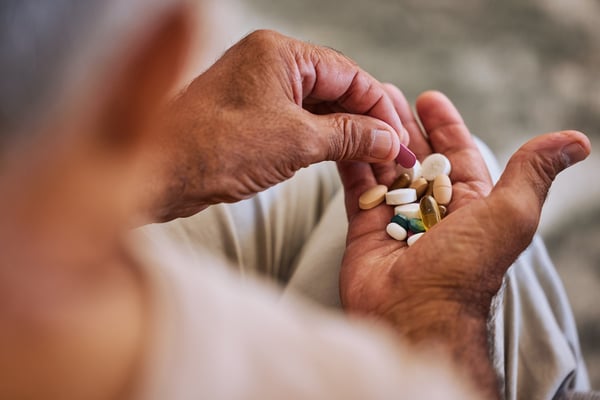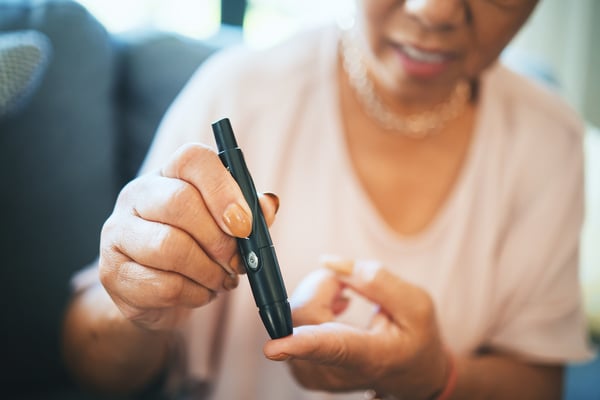Positive Outcomes in Chronic Conditions Rely on Patient Education

As more patients than ever are prescribed specialty medications to manage their health, we must ask ourselves “What is the best way to maximize the benefit of these complex and expensive medications?” The key to improving patient education and unlocking cost savings can likely be found in our overburdened healthcare system.
The growth of specialty medication in patient care
Specialty medications are pharmaceutical therapies that are either high in cost or complexity, oftentimes, both. The use of these medications has grown in recent years and shows no signs of stopping. In fact, recent data shows that specialty medications account for more than half of pharmacy spend.
Even more mind-boggling is the growth of specialty medication spending over time. In 2021, specialty medications totaled $301 billion in cost, a massive increase of 43% since 2016.
The role of specialty medication in treating chronic conditions
With growth figures like these, one might think a massive percentage of the United States population takes a specialty medication. However, that’s far from the truth. Only 2% of the population uses these medications, but they staggeringly account for over half of our nation’s pharmacy spending. How could this be?
The primary driver of these high costs is the fact that many specialty medications are used to treat chronic conditions. While chronic conditions take many forms, some of the most common include:
- Heart disease
- Cancer
- Chronic obstructive pulmonary disease (COPD)
- Diabetes
A commonality among these conditions is that they are ongoing, usually requiring treatment lasting more than a year, or perhaps a lifetime. Fortunately for patients living with these conditions, their health and quality of life can be managed and improved through healthy behaviors and prescription therapies. Specialty medications are ensuring better outcomes for chronically ill patients than ever before.

How clinical pharmacists can help manage specialty medications
The effectiveness of specialty medications depends on patients maintaining adherence to their regimens, just like any other medication. However, specialty medications raise the stakes. Often the condition being treated is more serious, and the medications are higher cost—so it’s critical that these regimens are managed for the maximum benefit.
Historically, the most common way that specialty medications have been managed was through specialty pharmacies. Because these medications are usually not available at standard pharmacies, specialty pharmacies carry drugs of higher complexity and can educate patients on how to properly use them. However, with the increasing adoption of medication home delivery in recent years, patients no longer find themselves with the opportunity to speak with a pharmacist about their medication-related questions.
Why patient education is essential to specialty medication management
With adherence playing a critical role in making specialty medications effective, what’s the best way to ensure adherence? The answer—patient education. Patient education plays a key role in medication adherence because it equips patients with the tools necessary to make the right decisions for their health, rather than following orders or simply “taking this because my doctor told me to.” When patients aren’t educated about their health or medications, sometimes they simply don’t know what action to take. Patient education from highly qualified clinical pharmacists, healthcare’s top medication experts, is the best way to improve adherence to specialty medications.
How clinical pharmacists can improve patient education for chronic conditions
While home delivery options are making it more convenient for patients to get their medications, they still need access to pharmacists for proper education on how to take their complex specialty prescriptions. Fortunately, platforms such as Aspen RxHealth can do just that. Through an iOS app, Aspen RxHealth pharmacists are telephonically connected with patients for care delivery. Now patients can have the same critical access to a pharmacist from anywhere—through a simple phone call.
Diving deeper, Aspen RxHealth does more than connect pharmacists and patients through a phone call. Our technology platform curates matches between pharmacists and patients based on patient conditions, language, location, and pharmacist specialty, to name a few. Matching in this way creates strong, long-lasting patient pharmacist relationships. The resulting consultations are empathetic in approach, highly efficient, and most importantly, highly effective in helping patients improve their health through optimized medication use.
If you’re a health plan, at-risk provider group, or other healthcare organization searching for a partner to educate your chronically ill populations about their medications, we’d love to help. Let us ensure the highest efficacy of medication use to help you do what you do best—keep your populations healthy.
Speak with a member of the Aspen RxHealth team to learn more and start exploring solutions.